Background
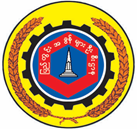
Internal Revenue Department
Background
1. The Administration System in the Union of Myanmar was a slightly modified Colonial administration system. It was not effectively beneficial to the country and the people. Thus, the implementation of new Administration System was required and the Revolutionary Council issued Notification No. 97 dated March 15, 1972 which enacted new procedures for restructuring of administration mechanisms.
2. According to the Notification No. 97, in order to implement new administration system, Ministry of Planning and Finance merged Profit Tax Department, Commercial Tax Department, Excise Department, State Lottery Department, Stamp Duty Department, the Revenue Section of the General Administration Department, and the Office of the Financial Commissioner which existed separately and formed the Internal Revenue Department on 1-10-1972 in order to administer all tax assessments.
3. The first offices were 1 Internal Revenue Department (headquarters), 6 Directorates, 14 Region/State offices, 250 township offices – totalling 271 offices. The headquarter was in Yangon. At that time, the title of the head of the department was Chairman. Later on, it was changed to Director General. Internal Revenue Department administered 10 kinds of taxes and duties, namely income tax, profit tax, commercial tax, excise tax, State lottery tax, stamp duty, land tax, water tax and embankment tax, fisheries tax and mineral tax (crops tax in Shan State).
4. Socialist Economic System was adopted before 1988 and Market Economy System was adopted after 1988 during Military Government Era. In order to ensure more effective tax collection system, five kinds of taxes and duties administered by the IRD were transferred to other relevant departments. Land tax, water tax and embankment tax, excise tax and mineral tax were transferred to the General Administration Department and fisheries tax was transferred to Fisheries Department on 1-4-1989.
5. Types of tax collected and Tax Laws enacted to assess taxes by eras, before and after establishment of Internal Revenue Department, are:
|
Sr |
Era and Types of Tax |
Tax Law and Year Enacted |
|
|---|---|---|---|
|
1
2
3
4
5
6
7
8
9
|
1 2 3
4 5 6 7
8
9 10 11 12 13 14 15 16
17 18
19 20 21
22
23
24
25 26
27
28 |
Myanmar King Dynasty
Salt Tax Palm Tax Fisheries and Irrigation Tax
Colonial Era Capitation Tax Property Tax Court Fees Land Tax
Customs Duties
Stamp Duty Forest Tax Fisheries Tax Excise Tax Profit Tax Cigarettes Duty Matches Tax Aerated water and beverages Tax
Japanese Occupation
After World War, before Independence
Entertainment Tax Profit Tax
After Independence
Business Profit Tax Sales Tax Business Premise Tax
Hotel and Restaurant Tax
Entertainment Tax
Revolutionary Council Era Income Tax
Socialist Era Profit Tax Goods and Service Tax
The State Law and Order Restoration Council and The State Peace and Development Council Era
Commercial Tax Union Government
Specific Goods Tax |
The Court Fees Act (1870) Land and Revenue Act (1876) The Lower Burma Land and Revenue Act The Lower Burma Town and Village Lands Act The Upper Burma Land and Revenue Regulations
Sea Customs Act (1878) Custom Duties Law (1924) The Burma Stamp Act (1899) Forest Tax (1902) The Fisheries Act (1905) The Burma Excise Tax (1917) The Indian Income Tax Act (1922) The Cigarettes Duty Act (1931) The Matches Act (1934) The Excisable Goods Rules (1959)
Due to inflation, rather than tax collection in crops, the existing taxes were remained unchanged.
The Entertainment Tax Act (1947) was continued in effect by Government of Burma (Adaptation of Laws) Order, 1937
1948 Business Profit Tax Act Sales Tax Act of 1952 1956 Business Premise Tax Act
Hotel and Restaurant Tax of 1949
The Entertainment Tax Act of 1947
Income Tax Law (1974)
Profit Tax Law (1976) Goods and Service Tax Law (1976)
Commercial Tax Law (1990)
Specific Goods Tax Law (2016) |
Gradual Changes in organization structure
6. In implementation of the New Administration System and in exercising the powers conferred under the Notification No. 97, dated 15-3-1972, of the Revolutionary Council, Internal Revenue Department was established on 1.10.1972 with 279 officer positions and 3043 staff positions, totalling 3322 positions.
7. With the approval of the Cabinet Meeting No. 12/2004 of the State Peace and Development Council on 18-3-2004, Internal Revenue Department was restructured with 583 officer positions and 4160 staff positions, totalling 4743 positions.
8. With the approval of the Cabinet Meeting No. 2/2012 of the Government of the Union of Myanmar on 12-1-2012, Internal Revenue Department was restructured with 778 officer positions and 4122 staff positions, totalling 4900 positions.
9. With the approval of the Cabinet Meeting No. 12/2014 of the Government of the Union of Myanmar on 19-6-2014, Internal Revenue Department was restructured with 1091 officer positions and 5186 staff positions, totalling 6259 positions.
10. With the decision of the Cabinet Meeting No. 1/2016 of the Republic of the Union of Myanmar on 7-1-2016, the organization structure of Internal Revenue Department was redesigned without changing the total number of manpower -1091 officer positions and 5186 staff positions, totalling 6259 positions.
Main duties and responsibilities
11. Internal Revenue Department sets 8 policies and 5 missions in order to ensure full tax collection, to reform the tax administration system to be in line with Market Economy System and to regulate money circulation and inflation with the tax administration system.
(a) Policy
(1) To establish a firm legal framework which enables the Internal Revenue Department to work on the processes effectively
(2) Re-organize the Internal Revenue Department to be in line with the new administration procedures
(3) To modernize tax assessment processes
(4) To utilize technology fully in order to simplify and organize processes and procedures
(5) To utilize Service and Enforcement programs in order to manage risks
(6) To develop the staff in order to enable them to use their capability and capacity to the full extent
(7) To develop leadership and governance programs to ensure the reforms are managed
(8) To increase transparency and accountability in all aspects of administration
(b) Mission
(1) To facilitate the socio-economic development of the country and the people by strengthening tax assessment in line with the laws in order to ensure full tax collection
(2) To assist the taxpayers with taxpayer education programs and other services to increase voluntary compliance and to change to self-assessment system
(3) To build trust by doing tax assessment accurately and truthfully in accordance with the tax laws
(4) to upgrade the tax offices to enable the use of modern technologies and to work effectively and systematically
(5) To provide staff with training opportunities to consistently develop skills, experience and knowledge
12. The main objective is to collect revenue to cover the expenditure of the government and to facilitate the economic development, but revenue collection also aims to implement the following objectives -
- To steady the budgeting system and to regulate money circulation and inflation
- To stabilize domestic consumption, investment and saving
- To stabilize commodity prices
- To balance distribution of wealth
- To facilitate economic development
- To facilitate the implementation of the economic objectives of the State
- To protect domestic industrial businesses
List of Director Generals and the period of service
13. Names of the Director Generals and the period of service from the date of the establishment of Internal Revenue Department are as follows:
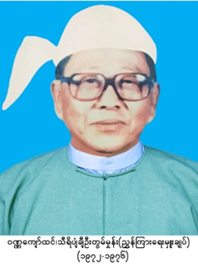
Name - Wanna Htin Kyaw Thiri Pyanchi U Twam Mone
Qualification - B.A Hons (Eng)
Title - Thiri Pyanchi (1949)
Date of Birth - 11-3-1917
Period - 2-10-1972 to 22-12-1976
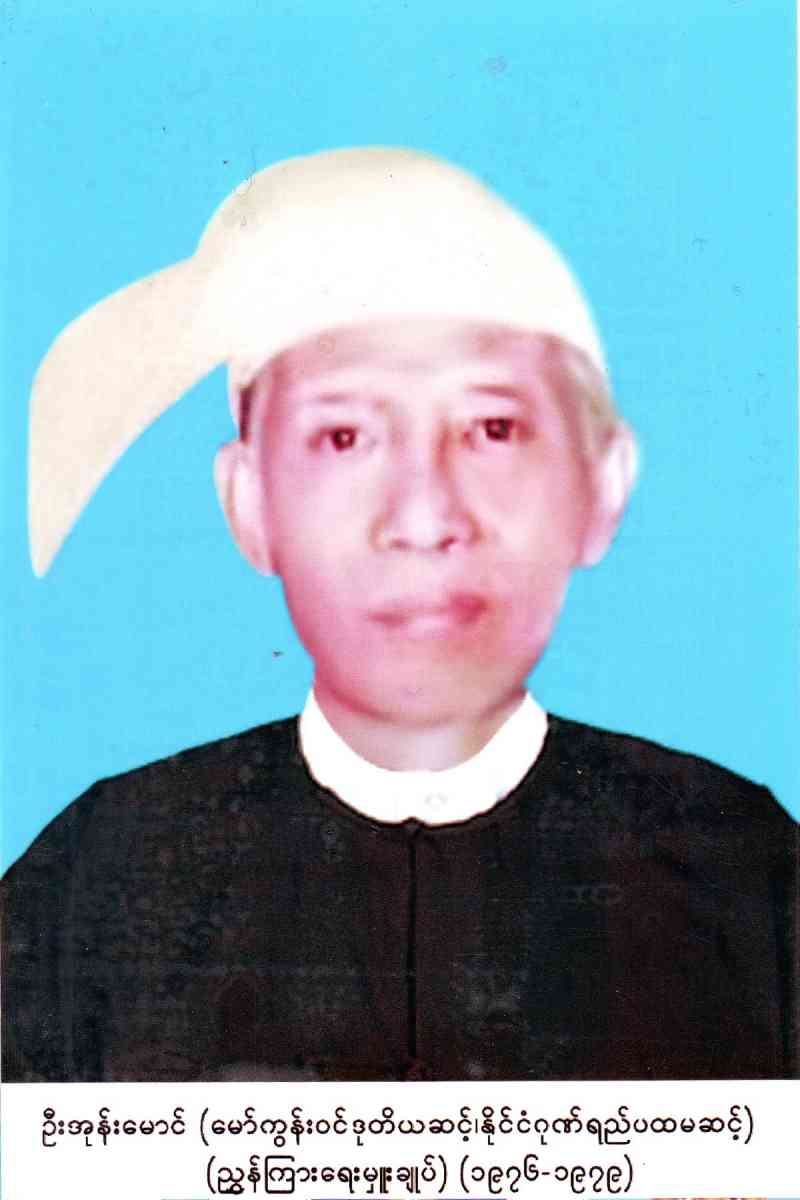
Name - U Ohn Maung
Qualification - -
Title - Mawgunwin Title (Second Class) , Naingngan Gonyi Title (First Class)
Date of Birth - -
Period - 23-12-1976 to 1-9-197
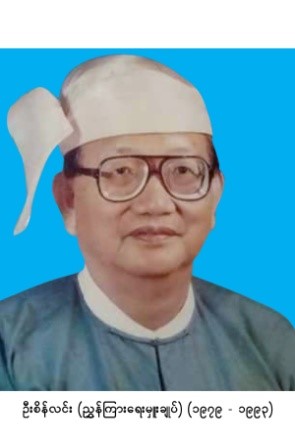
Name - U Sein Lin
Qualification - B.Sc, B.L, D.M.A
Title - -
Date of Birth - 16-5-1933
Period - 17-9-1979 to 15-5-1993
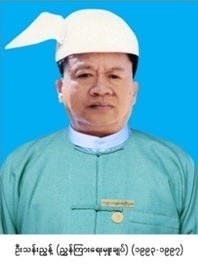
Name - U Than Nyunt
Qualification - B.Sc (DSA)
Title - -
Date of Birth - 18-11-1947
Period - 5-8-1993 to 5-9-1997
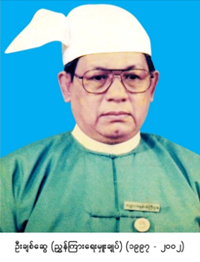
Name - U Chit Swe
Qualification - B.Sc
Title - -
Date of Birth - 14-10-1942
Period - 5-9-1997 to 14-10-2002
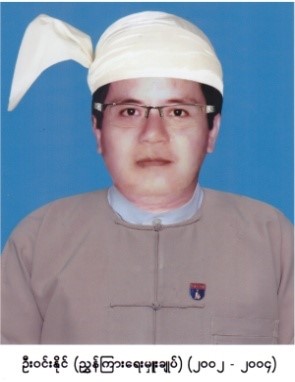
Name - U Win Naing
Qualification - B.Sc (DSA)
Title - -
Date of Birth - 26-10-1949
Period - 25-11-2002 to 14-11-2004
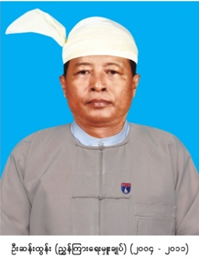
Name - U San Tun
Qualification - B.Sc (DSA)
Title - -
Date of Birth - 9-9-1951
Period - 14-11-2004 to 9-5-2011
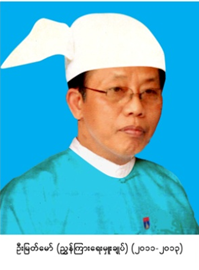
Name - U Myat Maw
Qualification - B.Sc (DSA), M.A (Defence Studies)
Title - -
Date of Birth - 1-12-1955
Period - 9-5-2011 to 28-3-2013
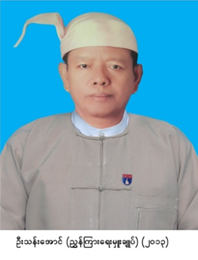
Name - U Than Aung
Qualification - B.A (L.L.B)
Title - -
Date of Birth - 18-3-1955
Period - 29-3-2013 to 23-5-2013
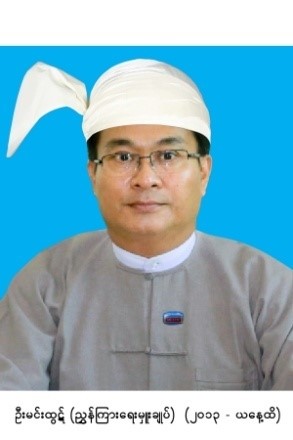
Name - U Min Htut
Qualification - B.Sc (DSA)
Title - -
Date of Birth - 19-12-1963
Period - 24-5-2013 to Present
|
Sr |
Name |
Period |
|
|---|---|---|---|
|
From |
To |
||
|
1 |
Wanna Htin Kyaw Thiri Pyanchi U Twam Mone B.A (Hons) |
2-10-1972 |
22-12-1976 |
|
2 |
U Ohn Maung Mawgunwin Title (Second Class), Naingngan Gonyi Title (First Class) |
23-12-1976 |
1-9-1979 |
|
3 |
U Sein Lin, B.Sc, B.L, D.M.A |
17-9-1979 |
15-5-1993 |
|
4 |
U Than Nyunt, B.Sc (DSA) |
5-8-1993 |
5-9-1997 |
|
5 |
U Chit Swe, B.Sc |
5-9-1997 |
14-10-2002 |
|
6 |
U Win Naing, B.Sc (DSA) |
25-11-2002 |
14-11-2004 |
|
7 |
U San Tun, B.Sc (DSA) |
14-11-2004 |
9-5-2011 |
|
8 |
U Myat Maw, B.Sc (DSA), M.A (Defence ) |
9-5-2011 |
28-3-2013 |
|
9 |
U Than Aung, B.A (LLB) (temp attached) |
29-3-2013 |
23-5-2013 |
|
10 |
U Min Htut, B.Sc (DSA) |
24-5-2013 |
Present |
Reform Activities
14. Internal Revenue Department has carried out policy reforms and procedural reforms.
(a) Policy Reform
(1) As a policy reform of Internal Revenue Department, Large Taxpayer Office (LTO) was established on 1-4-2014 in order to change to the self-assessment system (SAS) from the previous practice of the official assessment system (OAS).
(2) The self-assessment system (SAS) is also practiced in Medium Taxpayer Office 1 from 1-4-2017.
(b) Progress and Reforms which have been made
(1) Seeking financial and technical assistance from International Orgainzations such as International Monetary Fund, World Bank and Office of Technical Assistance, US Department of Treasury to implement modern taxation system
(2) Implementation of Tax Reform Programs with financing and grants provided toward Modernization of Public Finance Management Project of the World Bank
(3) State Lottery Department increased the amount of lottery award to 1,500 lakhs mmk as a special award from Draw No. 277 (Draw Date: 1-2-2012) onwards.
(4) Established Board of Scrutinizing and Monitoring of Tax Collection by the Notification No. 31/2013 dated 8-5-2013 to scrutinize, in collecting the tax, whether taxes are collected properly or not and to give suggestions to the Minister of Finance on current taxation system for ensuring proper tax collection and meeting international standards
(5) Established Taxpayer Service Units in Yangon Region on (19-10-2012) and in Mandalay Region on (20-5-2013) in order to provide answers to the questions raised by the people with regards to tax matters; to assist in submitting the complaints relating to tax matters; to setttle the complaints and to provide tax information to the foreign investors
(6) Hold Tax Reform Program Steering Committee meeting once a month from 2015 February onward
(7) In order to collect the actual tax from restaurants, Tax Label Project was initiated (Affixing tax labels equivalent to the amount of commercial tax on the receipts to the customers) as a pilot project in Yangon Development Council area from 1 November 2014 onwards and continued in the whole country from 1 April 2015 onwards to have tax labels affixed on the receipts issued by restaurants and hotels
(8) With the approval of the Cabinet Meeting No. 4/2015 of the Union Government, the Ministry of Finance issued Notification No. 628/2015 dated 9-3-2015 to form revenue-raising steering committee, region and state level revenue-raising workgroups and township/ village level revenue-raising workgroups.
(9) Transformed Company Circle Tax Office to Medium Taxpayer Offices and established Medium Taxpayer Office 1 and 2 on 11-6-2015
(10) Established Medium Taxpayer Office 3 by the Notification No. 054 of Internal Revenue Department of the Ministry of Finance dated 10-3-2016
(11) According to the Letter of the Accounts Directorate of the Internal Revenue Department dated 30-5-2016 with the letter no.1(8)/accounts-1/patakha/2016(539), licensed stamped paper resellers are appointed. On 1-6-2016, 298 resellers were permitted to resell stamped paper in 93 townships.
(12) State Lottery Directorate of the Internal Revenue Department will start selling 500-kyat lottery tickets in March 2017 and the first draw will be on April 1st.
(13) Yearly nationwide collection of the various kinds of taxes is as follows: -
(million kyats)
|
Sr |
Financial Year |
Earmarked |
Collection |
Percentage |
|---|---|---|---|---|
|
1 |
1972-1973 |
897.255 |
874.738 |
97.49 |
|
2 |
1973-1974 |
438.483 |
474.731 |
108.27 |
|
3 |
1974-1975 |
1050.472 |
1129.368 |
107.51 |
|
4 |
1975-1976 |
1207.383 |
1326.192 |
109.84 |
|
5 |
1976-1977 |
2096.628 |
2005.645 |
95.66 |
|
6 |
1977-1978 |
2343.311 |
2437.503 |
104.02 |
|
7 |
1978-1979 |
2477.905 |
2385.961 |
96.29 |
|
8 |
1979-1980 |
2570.215 |
2626.469 |
102.19 |
|
9 |
1980-1981 |
2708.280 |
2692.626 |
99.42 |
|
10 |
1981-1982 |
2921.049 |
2965.050 |
101.51 |
|
11 |
1982-1983 |
2591.870 |
3102.393 |
119.70 |
|
12 |
1983-1984 |
3144.409 |
3322.664 |
105.70 |
|
13 |
1984-1985 |
3227.185 |
3333.507 |
103.30 |
|
14 |
1985-1986 |
3302.395 |
3396.751 |
102.86 |
|
15 |
1986-1987 |
3228.251 |
3303.845 |
102.34 |
|
16 |
1987-1988 |
3360.280 |
2274.970 |
100.44 |
|
17 |
1988-1989 |
1636.200 |
2599.920 |
158.90 |
|
18 |
1989-1990 |
2875.000 |
3679.692 |
128.12 |
|
19 |
1990-1991 |
4938.460 |
6574.341 |
133.13 |
|
20 |
1991-1992 |
5192.420 |
6895.824 |
132.81 |
|
21 |
1992-1993 |
7247.330 |
8722.477 |
120.35 |
|
22 |
1993-1994 |
8653.590 |
11714.225 |
135.37 |
|
23 |
1994-1995 |
11978.970 |
15050.575 |
125.64 |
|
24 |
1995-1996 |
15347.890 |
17185.028 |
111.97 |
|
25 |
1996-1997 |
20240.72 |
21913.848 |
108.27 |
|
26 |
1997-1998 |
30356.070 |
38473.022 |
126.74 |
|
27 |
1998-1999 |
35681.410 |
48774.344 |
136.70 |
|
28 |
1999-2000 |
43105.790 |
52506.260 |
121.81 |
|
29 |
2000-2001 |
96994.940 |
67538.850 |
69.63 |
|
30 |
2001-2002 |
99119.210 |
71806.530 |
72.44 |
|
31 |
2002-2003 |
99108.676 |
104789.460 |
105.53 |
|
32 |
2003-2004 |
203612.538 |
161842.319 |
79.49 |
|
33 |
2004-2005 |
214038.666 |
265186.233 |
123.90 |
|
34 |
2005-2006 |
403767.591 |
448156.802 |
110.99 |
|
35 |
2006-2007 |
566441.855 |
676774.171 |
119.48 |
|
36 |
2007-2008 |
707686.854 |
838428.830 |
118.47 |
|
37 |
2008-2009 |
886857.660 |
987925.965 |
111.40 |
|
38 |
2009-2010 |
912443.801 |
1037364.604 |
113.69 |
|
39 |
2010-2011 |
1025000.000 |
1186316.754 |
115.74 |
|
40 |
2011-2012 |
1028285.619 |
1528400.767 |
148.64 |
|
41 |
2012-2013 |
1551286.840 |
2697506.135 |
173.89 |
|
42 |
2013-2014 |
2815015.376 |
3567566.183 |
126.73 |
|
43 |
2014-2015 |
3719376.710 |
4185357.788 |
112.53 |
|
44 |
2015-2016 |
4547710.000 |
4591000.292 |
100.95 |
Laws administered by Ministry of Planning and Finance
15. Amendment and Repeal of the old laws/ Enactment of new laws are as follow: - Court Fees Act, the Myanmar Stamp Act, Income Tax Law, Goods and Service Tax Law, Profit Tax Law, Commercial Tax Law and Specific Goods Tax Law of the Internal Revenue Department
(a) Court Fees Act: Court Fees Act, 1870 (Law No 7/1870) came into effect in India and also came into effect in Myanmar, according to The Government of Myanmar Act, 1935, when Myanmar was administered as one of the region of India under British Colonial administration. Court Fees Act did not have effect in some regions and states according to the section 40 of The Government of Myanmar Act, 1935. It came into effect in the whole country by the Notification No. 18/97 dated (27-11-97) of the Union Government. Since 1870, there were about 30 Amendment Acts including India Amendment Acts. Before and after independence, some expressions were replaced according to Laws and Orders.
(1) The Myanmar Court Fees (Amendment) Act, 1945
(2) The Myanmar Court Fees (Amendment) Act, 1946
(3) The Union of Myanmar (Adaptation of Laws) Order, 1948
(4) The Myanmar Court Fees (Amendment) Act, 1950
(5) The Myanmar Court Fees (Amendment) Act, 1957
(6) The Myanmar Court Fees (Amendment) Act, 1958
(7) Amendment to the Myanmar Court Fees Act on 30-9-90
(8) The Law Amending the Court Fees Act, the Pyidaungsu Hluttaw Law No. 5 on (29-9-2011)
(9) The Law Amending the Court Fees Act, the Pyidaungsu Hluttaw Law No. 14 on (19-3-2014)
(b) The Myanmar Stamp Act: The Myanmar Stamp Act, 1899 did not have effect in some regions contained in the schedule, according to Government of Burma Act, 1935. Now, it came into effect in the whole country according to the Notification No. 18/97 of the Union Government dated 27-11-97. There were total 26 laws compromising amendments acts and Adaptation of Expression Laws from 1899 through 1945, before independence. From 1946 through April 2012, some expressions were replaced according to Amendment Laws and Orders.
(1) The Myanmar Stamp (Amendment) Act, 1946
(2) The Myanmar Stamp (Amendment) (Validating)Act, XIX of 1946
(3) The Union of Myanmar (Adaptation of Laws) Order, 1948
(4) The Myanmar Stamp (Amendment) Act, 1950
(5) The Myanmar Stamp (Amendment) Act, 1953
(6) The Myanmar Stamp (Amendment) Act, 1957
(7) Amendment to the Myanmar Stamp Act on 30-9-90
(8) The Law Amending the Myanmar Stamp Act, the Pyidaungsu Hluttaw Law No. 2 on (29-9-2011)
(9) The Law Amending the Myanmar Stamp Act, the Pyidaungsu Hluttaw Law No. 19 on (28-3-2014)
(c) Income Tax Law: Income Tax Law was enacted by the Revolutionary Council with the Law No.7 and came into effect from 1-4-74. Amendments/Enactments are as below
(1) Issuance of Income Tax Rule by the Rule No. 1/89 of the State Law and Order Restoration Council dated 22-3-1989
(2) Issuance of Income Tax Regulations by the Notification No. 1/89 of the Cabinet of the Union of Myanmar dated 24-3-1989
(3) Amending Income Tax Regulations by the Notification No. 7/91 of the Cabinet of the Union of Myanmar dated 16-5-1991
(4) Amending Income Tax Regulations by the Notification No. 6/94 of the Cabinet of the Union of Myanmar dated 2-5-1994
(5) Amending Income Tax Law 2006
(6) Amending Income Tax Law by The Pyidaungsu Hluttaw Law No. 4 on 29-9-2011
(7) Amending Income Tax Law by The Pyidaungsu Hluttaw Law No. 15 on 24-3-2014
(8) Amending Income Tax Law by The Pyidaungsu Hluttaw Law No. 36 on 31-8-2016
(d) Goods and Service Tax Law: This is 1976 The Pyithu Hluttaw Law No. 3 enacted by the Pyithu Hluttaw, to be in line with Socialist Economic System, and to assess tax on State-owned enterprises and production cooperative societies. This law came into effect from 1-4-76. This law was repealed by the Law for the repeal of laws, 1993 (second time).
(e) Profit Tax Law
(1) A new law enacted by Pyithu Hluttaw in accordance with Socialist Economic System. It was to assess tax on the income of individuals and private sector. Moreover, tax on imports and entertainment and tax due on production of salt were assessed by Profit Tax Law effective from 1-4-76. Income Tax law was not applied to individual business owners from 1-4-76. No books and records were required for tax assessment. There were 4 amendments of Profit Tax Law. Profit Tax Law was amended in 1986, 1987, 1989 and 1991. Profit Tax regulations were added in 1987.
(2) The Law for the Repeal of the Profit Tax Law, The Pyidaungsu Hluttaw Law No. 1, was enacted on 29-9-2011. It enacted that matters to be assessed in accordance by the Profit Tax Law shall be assessed according to the provisions of the Income Tax Law effective from 2011-2012 assessment year.
(f) Commercial Tax Law: Commercial Tax Law was a new law enacted by the State Law and Order Restoration Council with the Law No. 8/90 and came into effect from 1-4-90. Amendments/Enactments are as below;
(1) Amendment by Law No. 5/91 of the State Law and Order Restoration Council
(2) Amendment by Law No. 2/2006 of the State Peace and Development Council
(3) Amending the Commercial Tax Law by The Pyidaungsu Hluttaw Law No. 3 on 29-9-2011
(4) Amending the Commercial Tax Law by The Pyidaungsu Hluttaw Law No. 16 on 24-3-2014
(5) Amending the Commercial Tax Law by The Pyidaungsu Hluttaw Law No. 18 on 2-4-2015
(g) Union Taxation Law
(1) Pyidaungsu Hluttaw enacted Union Taxation Law 2014 by The Pyidaungsu Hluttaw Law No. 20 on 28-3-2014.
(2) Pyidaungsu Hluttaw enacted Union Taxation Law 2015 by The Pyidaungsu Hluttaw Law No. 17 on 2-4-2015.
(3) Pyidaungsu Hluttaw enacted Union Taxation Law 2016 by The Pyidaungsu Hluttaw Law No. 22 on 25-1-2016.
(h) Specific Goods Tax
(1) Pyidaungsu Hluttaw enacted Specific Goods Tax by The Pyidaungsu Hluttaw Law No. 11 on 18-1-2016
_0.png)